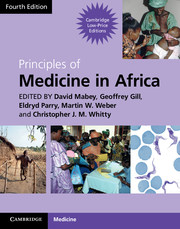Book contents
- Frontmatter
- Contents
- Contributors
- Foreword
- Section 1 Health and disease
- Section 2 Mother and child health
- Section 3 Infection: general principles
- Section 4 Major common infections
- Section 5 Bacterial infections
- Section 6 Viral Infections
- Section 7 Protozoal infections
- Section 8 Helminth infections
- Section 9 Fungal infections
- Section 10 Non-communicable diseases
- 56 Chronic and non-communicable disease in Africa
- 57 Chronic non-communicable disease in health care
- 58 Diabetes mellitus
- 59 Hypertension
- 60 Stroke
- 61 Epilepsy
- 62 Mental health
- 63 Asthma, chronic obstructive pulmonary disease (COPD) and exposure to indoor air pollution
- 64 The disabled patient
- Section 11 Diseases of body systems
- Section 12 Cancer and Palliative Care
- Section 13 Venoms and Poisons
- Index
- References
57 - Chronic non-communicable disease in health care
from Section 10 - Non-communicable diseases
Published online by Cambridge University Press: 05 March 2013
- Frontmatter
- Contents
- Contributors
- Foreword
- Section 1 Health and disease
- Section 2 Mother and child health
- Section 3 Infection: general principles
- Section 4 Major common infections
- Section 5 Bacterial infections
- Section 6 Viral Infections
- Section 7 Protozoal infections
- Section 8 Helminth infections
- Section 9 Fungal infections
- Section 10 Non-communicable diseases
- 56 Chronic and non-communicable disease in Africa
- 57 Chronic non-communicable disease in health care
- 58 Diabetes mellitus
- 59 Hypertension
- 60 Stroke
- 61 Epilepsy
- 62 Mental health
- 63 Asthma, chronic obstructive pulmonary disease (COPD) and exposure to indoor air pollution
- 64 The disabled patient
- Section 11 Diseases of body systems
- Section 12 Cancer and Palliative Care
- Section 13 Venoms and Poisons
- Index
- References
Summary
The problem in Africa
Excellent but costly care is available for chronic disease in cities, but this only sharpens substantial inequities in access to care, between the urban rich and the urban and rural poor. Treatment gaps for prevalent chronic diseases are unacceptably high between countries; within-country disparities are even more pronounced, with gaps in rural areas often approaching 100 per cent because health services focus almost entirely on acute curative and episodic care (Samb et al., 2010).
Something has to be done to develop systems of primary care that are comprehensive and that are not dwarfed by externally driven vertical programmes; and to narrow these shameful treatment gaps.
The WHO 2008 Report, Primary Health Care: Now More Than ever, asserts that “a system's failure requires a system's solution” and warns against over-emphasis on specialized curative care and fragmented service delivery for short-term results (World Health Organization, 2008a).
The burden of non-communicable diseases (NCDs) in rural Africa is best addressed through strengthened primary health care.
The cycle of poverty and disease must be interrupted at the level of social determinants, as well as individual diseases (Geneau et al., 2010). This requires a broader, more comprehensive approach to health, and runs counter to the existing emphasis in health systems across Africa towards specialized and facility-based care. Health concerns us all – people, patients, communities, health extension workers – as well as other sectors: education, labour and agriculture. All of these people will need to work together to implement effective, evidence-based, and locally adapted health systems solutions.
- Type
- Chapter
- Information
- Principles of Medicine in Africa , pp. 493 - 498Publisher: Cambridge University PressPrint publication year: 2013



